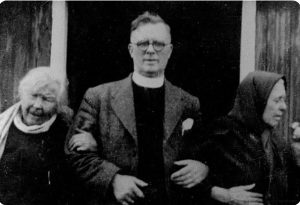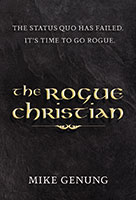
The following is a chapter from my new book; The Way of the Rogue; Living a Life that Counts for Eternity. In this chapter I recount the story of the spiritual awakening in the Hebrides Islands near Scotland in 1950. As you will see, two sisters in their 80’s who were devoted to prayer were the catalyst and leaders of one of the most powerful moves of God in the last 150 years.
The Cottage of Prayer
I’d rather be able to pray than to be a great preacher; Jesus Christ never taught his disciples how to preach, but only how to pray.
—D. L. Moody
The sickness of the church, I believe, is twofold. First, . . . we have not taught them to worship. Christians will not take the time before God to see Him in glory and majesty and holiness. . . The second cause of the church’s sickness is that the prayer meeting has become obsolete.
—Leonard Ravenhill
The Hebrides are an archipelago, a cluster of more than 100 islands off the northwest coast of Scotland. One of those islands, the island of Lewis and Harris, is Scotland’s largest island. On the island are two communities that encompass 891 square miles on one land mass, Lewis to the north and Harris to the south.
In 1949, the population of Lewis and Harris was around 25,000. Many made their living by crafting and weaving. Picturesque, thatched cottages dotted the landscape. The island was filled with churches—churches that had gone cold. Legalism was thriving, prayer and Scripture reading had become ritualistic exercises. Their youth were turned off to such an extent that they abandoned the church in droves. Dance halls, movie theaters, and pubs were their new places of worship. Feeling a sense of urgency, the Free Church Presbytery of Lewis published the following in the Stornoway Gazette on December 9, 1949:
The Presbytery of Lewis having taken into consideration the low state of vital religion within their own bounds, and throughout the land generally, call upon their faithful people in all their congregations to take a serious view of the present dispensation of divine displeasure manifested, not only in the chaotic conditions of international politics and domestic economics and morality, but also, and especially, in the lack of spiritual power from Gospel Ordinances, and to realize that these things plainly indicate that the Most High has a controversy with the nation. They note especially the growing carelessness toward Sabbath observance and public worship, the light regard of solemn vows and obligations so that the sacraments of the church – especially that of baptism – tend to become in too many cases an offence to God rather than a means of grace to the recipients, and the spreading abroad of the spirit of pleasure which has taken such a hold of the younger generation that all regard for anything higher appears with very few exceptions to have been utterly dismissed from their thoughts. . . .
The presbytery affectionately plead with their people, especially the youth in the church, to take these matters to heart, and to make serious inquiry, as to what must be the end; should there be no repentance, . . . and they call upon every individual as before God, to examine his or her life in the light of that responsibility, which pertains to us all. But happily, in the divine mask, we may be visited with the Spirit of repentance, and return again unto the Lord, whom we have so grieved with our iniquities, and waywardness. Especially would the warn their young people, of the devils man traps, the cinema and the public house.
Peggy Smith, 84, and Christine Smith, 82, were two sisters who lived in a small cottage in Barvis on the island. Peggy was blind; Christine was riddled with arthritis. Unable to go to church, their cottage became a house of prayer where they spent hours seeking the Lord on their knees. During one of Peggy’s prayer sessions, she was given a vision. She saw the churches of the islands packed with youth and a picture of an unknown minister speaking from the pulpit. She heard Isaiah 44:3 (KJV): “For I will pour water upon him that is thirsty, and floods upon the dry ground.”
One parish minister, Mr. McCie, had tried outreaches and other events to attract the youth with no success. After Peggy received the vision, she sent for him and said, “I’m sure, Mr. McCie, that you’re longing to see God working. What about calling your office bearers together, and suggest to them that you spend two nights a week waiting upon God in prayer. You’ve tried mission, you’ve tried special evangelists. Mr. McCie, have you tried God?”
After McCie recovered from embarrassment, his church agreed to pray Tuesdays and Fridays from 10:00 p.m. until 4:00 a.m. The minister and several others from his church prayed in a farmhouse barn while Peggy and Christine prayed at their cottage.
Their prayer meetings went on for several months. During one of the men’s meetings in the barn, a young man rose and started to read from Psalm 24.
Who shall ascend the hill of the Lord?
And who shall stand in his holy place?
He who has clean hands and a pure heart,
who does not lift up his soul to what is false
and does not swear deceitfully.
He will receive blessing from the Lord.
—Psalm 24:3–5
Then he abruptly shut his Bible, looked at the others, and said, “It seems to me just so much humbug. To be praying, as we are praying, to be waiting as we are waiting, if we ourselves, are not rightly related to God. Oh, my dear brethren let’s take that to heart.” He lifted his eyes and prayed, saying, “God, are my hands clean? Is my heart pure?” And then he dropped face down on the straw.
That night, spiritual awakening detonated in Lewis. The community suddenly found themselves gripped with an awareness of God. People started meeting in groups, out in the fields, in homes, everywhere, talking about the sense of God’s presence that had descended on them.
Days later, at Peggy’s request, McCie sent a letter to Duncan Campbell, a Scottish minister on the mainland, and asked him to come to Lewis. Peggy believed Duncan was the man God showed her in the vision. Duncan replied with a letter saying he couldn’t come because he had a major Christian convention on the mainland he was committed to, and people from all over the United Kingdom would be attending. When McCie showed the letter to Peggy, she said, “Mr. McCie, that is what man is saying, but God has said something else, and he’ll be here within a fortnight.”
The convention was cancelled. Soon after, Duncan Campbell landed at the port of Harris for what he planned to be a 10-day visit. As Duncan disembarked the vessel, an elderly man met him and immediately asked, “Mr. Campbell, can I ask you this question, are you walking with God?” Duncan immediately understood that these people were dead serious about the Lord and replied, “Well, I think I can say this, that I fear God.” His host responded, “Well, if you fear God, that will do.”
The elder took Duncan to a church at 9:00 p.m. to give a message. Around 300 people came. At 11:00 p.m., after he gave the benediction, a young man approached Campbell. “Nothing has broken out tonight, but God is hovering over us. He’s hovering over us, leave it be, and He’ll break through any moment.” Campbell didn’t sense anything but would later say, “Here is a man; much nearer to God than I was. Oh, he knew the secrets.” The young man prayed and said, “God you made a promise, to pour water on the thirsty, and floods upon the dry ground, and you’re not doing it.” He then dropped to the floor for five minutes in prayer. When they opened the church doors to leave, they were shocked to see that around 700 people were gathered around the church waiting to get in—at 11:00 p.m.! They sang Psalm 102. Duncan Campbell described what happened next.
There was a dance in progress that night in the parish, and while this young man was praying in the aisle; the power of God moved into that dance, and the young people (over a hundred of them) fled from the dance, as those fleeing from a plague, and they made for the church. I endeavored to get up into the pulpit. I found the way blocked with young people who’d been at the dance. When I went into the pulpit, I found a young woman, (a graduate of university) who was at the dance, and she’s lying on the floor of the pulpit crying, “Is there nothing for me? Is there nothing for me? Is there nothing for me?” God was at work, and the old lady’s vision, now actual and real. A church crowded with young people, as well as old.
That church meeting went until 4:00 a.m., with many coming to Christ. As Duncan was leaving the church, someone told him that another 300 people were crowded around the police station, asking him to come immediately. Peggy and Christine’s cottage, the epicenter of prayer, was next door to the police station.
On the way to the police station, Campbell encountered a group of men at the side of the road crying out to God for mercy. Some of them had been at a bar and were partially drunk. Many of those by the road came to Christ, and at least nine of them eventually ended up in ministry positions. Duncan encountered more of the same at the police station, with people terrified of an eternal destination apart from God.
I can remember once within twenty-four hours addressing eight meetings; crowded churches five times, twice out in a field, once down at the shore where men would come across a lot there, old men, and they were sober that night. So many of them found a savior, that we followed them to a shore, and there we sang the songs of Zion at two o’clock in the morning before we left for their homes.
Duncan Campbell would spend the next two years giving messages all over the Hebrides. Churches were filled at all hours of the night with people crying out in terror for God to have mercy on them, torn in conviction over their sins. Duncan described some as being “in distress of soul, in terrible distress.” Instead of comforting them, church leaders left them in the terror of the Lord until they yielded completely to Him.
Leave them there, let God be with them. Though that I feel dear people, that we take things out of the hand of God by our council. Oh, that we might get to the place where with implicit confidence in God, we leave the work to Him.
Lewis and Harris were engulfed with the fear of the Lord. Many came to Christ out in the fields and by the side of the road. Prayer meetings were going on everywhere, all the time—in farmhouses, in fields, in churches . . .
. . . in most churches, that is. The ministers of the Hebrides awakening had no opposition from the secular world. Their only opposition was from several churches who disagreed with Duncan on one doctrinal issue.
One day Peggy approached Duncan. ”I feel lead to ask you to go to this particular part of this parish [that opposed him]. There are mighty sinners there, that need salvation.” Duncan replied, “You know I’ve no meetings to go there. There are men there that are bitterly opposing me, and ah, I don’t suppose I could get any place to hold a meeting.” Campbell recalled, “She looked at me, and said, ‘Mr. Campbell, if you were as near to God as you ought to be, He would reveal His secrets to you also.’” Then Peggy prayed, ”God, you remember the conversation we had this morning at two o’clock? And you told me you were going to visit this part of the parish with revival, and I’ve just spoken to Mr. Campbell about it. But, he’s not prepared to think of it. You better give him wisdom because the man badly needs it.”
Campbell went to the parish and found about 400 people gathered around a seven-room bungalow. Men and women, including some of the leading men of the village, were on their knees, crying out to God for mercy. These men came to Christ and would eventually become leaders in the church. The Hebrides Awakening was sparked, fueled, and powered by ongoing, fervent prayer meetings 24 hours a day. Duncan wrote:
You see, in Lewis, and in the high land generally, they would no more believe that you were a Christian, than they would believe that the devil was a Christian, if you don’t attend the prayer meetings. I agree with them. I certainly agree with them. When a soul is born again, suddenly there is created a hunger to be among the praying people of God. The prayer meetings become crowded. You couldn’t find a parish in Lewis today that hasn’t five prayer meetings. It was stated in the midst of the movement, “There are more people attending the prayer meetings now, than attended public worship on a communion Sunday.”
When God descended on the Hebrides, there had been no revival meetings, no conferences on revival, and no man-made plans for them. There were no worship bands or, as Campbell put it, “religious entertainment with crowds gathering to enjoy an evening of bright gospel singing.” There was no advertising or efforts to get people to come to church. People ran to church from bars, dance halls, and their homes. The fear of God grabbed them to such an extent that they were terrified of hell.
Those the Lord placed at the forefront of the movement, particularly Peggy and Christine Smith, two women in their 80s, were committed to prayer and holiness. They knew that a vibrant, consistent prayer life where Christians spend considerable time on their knees daily is critical, even mandatory, for every believer. The fruit of their prayer life was evident in their close, intimate relationship with God. There was no compromise with the things of this world, and they were totally focused on God. The December 1949 article in the Stornoway Gazette about the Free Church Presbytery of Lewis set the stage for holiness when they challenged the churches to warn people of the devil’s traps of the cinema and the dance halls.
When I read the story of the Hebrides Revival, I found myself yearning for more. I would love to have prayed with Peggy and Christine Smith. I’ll take a prayer meeting with those two women of God or the men who prayed in the barn over a modern church service with the video monitors and rock band anytime.
Francis Chan recounts the following story:
Years ago, my friend from India drove me to a speaking engagement in Dallas. When he heard the music and saw the lights, he said, “You Americans are funny. You won’t show up unless there’s a good speaker or band. In India, people get excited just to pray.” He proceeded to tell me how believers back home love communion and how they flock to simple prayer gatherings. I imagined God looking down on the earth and seeing people on one side of the planet gathering expectantly whenever prayer was happening. Meanwhile, on the other side of the planet, people show up only for the most talented people and the “atmosphere.” It’s embarrassing.
David Platt echoes this: “I am also struck by our reliance upon having just the right speaker and just the right musician who can attract the most people to a worship service.”
Peggy Smith would have been ignored or marginalized as a charity case in the seniors’ ministry in most of our modern churches. We have loud music and polished, entertaining preachers, even those who are good Bible teachers, but we have little in the way of spiritual power.
And when they had entered, they went up to the upper room, where they were staying, Peter and John and James and Andrew, Philip and Thomas, Bartholomew and Matthew, James the son of Alphaeus and Simon the Zealot and Judas the son of James. All these with one accord were devoting themselves to prayer, together with the women and Mary the mother of Jesus, and his brothers.
—Acts 1:13–14
Scholars believe the early church spent seven days straight in prayer meetings. Some say nine days. We barely spend 70 seconds in our weekend services. Spiritual power, as we see in Acts 1, comes from extended time in fervent prayer. We can study the Bible all we want, but it’s not until the church hits its knees in beseeching prayer that we become powerful. We may be the most theologically knowledgeable yet spiritually weak generation in history. If you doubt this, look at the news and the evil that has corrupted the country and the church; look at the hit parade of Christians getting caught in sin and those are who walking away from God in droves.
Correct views of Scripture do not constitute righteousness.
—Duncan Campbell
No prayer . . . no power . . . no holiness.
Many Christians, including pastors, say we can have all the movies, entertainment, and social media we want as long as the content isn’t sinful and we live a balanced life. They say there’s no need to take this Jesus thing too far. Enjoy as much of the world as you want, they claim; we don’t want you feeling uncomfortable. It would be too judgmental or make people uncomfortable to challenge people to spend an hour a day in prayer and set aside the time they spend on TV, movies, secular music, and their smartphones.
We’ve set the bar of the Christian life so low that a five-year-old could skip over it. Could you imagine walking into a church or Bible study where the people were so committed to God and His holiness that they asked you if you walked with God, just as Duncan Campbell was asked when he stepped off the boat in Lewis? Many hypersensitive, modern Christians would get offended if they were asked such a question. They may not even know how to answer. Many of our leaders have choked, prayerless lives as they lead biblically correct, prayerless churches filled with nice people who are no threat to the gates of hell.
I believe God told me that prayer would be critical this year. We’ve increased our prayer meetings at the office and added more Zoom and phone prayer groups for the public. I’ve taken more desert trips alone with God this year than any other and upped my personal prayer time in the morning and evening while challenging our followers to do the same.
But much more is needed. Jesus often prayed well into the night. As we just saw, the spiritual awakening in Hebrides was triggered after several months of twice a week 10:00 p.m. to 4:00 a.m. prayer meetings. The spiritual power gauge goes off the chart during all-night prayer. I prayed until 11:00 p.m. one night last weekend, and I’m hoping to find other local believers who are willing to join me. I’m nowhere close to a Peggy Smith, but I’m making incremental moves in that direction.
How about you? Your church? Are you willing to pay the price in prayer? How bad do you want a spiritual awakening? Do you see how desperately we need it right now? How hungry are you for breakthroughs in your family, community, church, and nation? How hungry are you for God? Are you willing to sacrifice your time with entertainment and the pleasures of this world in order to set your prayer life on fire?
Consider hosting a prayer meeting in your home or attending one at your church. If your church doesn’t have a prayer meeting, ask them to start one.
Pastors. I challenge you to make your churches houses of prayer. Spend a third of the time in your weekend service in prayer, and devote one service a month to prayer. Hold prayer meetings throughout the week, and keep them going even if only two people show up. You never know when a Peggy Smith might walk in and be the spark that sets your church on fire.
And they devoted themselves to the apostles’ teaching and the fellowship, to the breaking of bread and the prayers.
—Acts 2:42

Duncan Campbell with Peggy and Christine Smith
There are more stories like the one above in the new book.
You can purchase The Way of the Rogue; Living a Life that Counts for Eternity at the store at www.theroguechristian.com. The direct link to the store is https://theroguechristian.com/shop/. Quantity discounts are available as well as an e-book.

